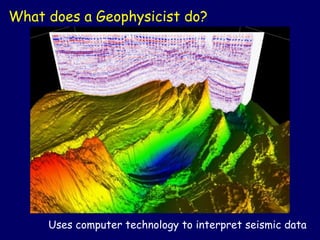All Categories
Featured
Table of Contents
Geophysical Surveys in Upper Swan Aus 2020
Connect with MBA programs seeking candidates like you. Research study. Connect with master's programs around the country to get an edge over the competition.

A geophysicist studies various aspects of the earth. According to the U.S. Geological Study, they study gravity, magnetic, electrical, and seismic activity events. Geophysicists likewise record, evaluate, and take measurements of geographical features and anomalies. Enjoy a video to learn what a geophysicist: Geophysicists must earn a minimum of a bachelor's degree; nevertheless, this is for an entry-level position.
Advanced degrees need more specific studies in the specialty of choice. Job potential customers are higher if you have a strong background in computer system science or technology.
Career Opportunities In Geology in Waikiki Aus 2022
Access to these chances might be restricted depending upon where you live; nevertheless, internships or summer season programs with geophysical companies, university geophysics department, or the U.S. Geological Survey can be choices. You can discover a list of a list of opportunities on the United States Geological Survey (USGS) websites' Path Programs tab (opens in another link).
If you have yet to finish high school, taking as many science and mathematics classes as possible would be a plus. Geophysicists also deal with computers while researching, so computer system courses can likewise be helpful, as discussed previously in this post. Many geophysicists concentrate on an area of geophysics. The job description would change pending on the specialized.
A geophysicist's tasks can include measuring, tracking, and documenting data from various physical homes in the world. They likewise evaluate and exam info got. Geophysicists often have to take a trip worldwide to take a look at geological events that have taken place or might have been forecasted. Geophysics is a research-based profession field, therefore one need to have the ability to hypothesize, problem-solve, and question or challenge formerly held assumptions from their collected data.
Geophysicist in Carramar Western Australia 2022
Jay Wellik, a geophysicist, research studies volcanos. Geophysicists generally work full-time hours; nevertheless, they often work irregular hours, as pointed out previously.

You can find additional info about Geophysicists along with additional academic materials on the U.S. Geological Survey website (links open in a brand-new window). Laura Stern, of the U.S. Geological Study at the Gas Hydrates Laboratory in Menlo Park, California: We make a variety of different hydrates in the laboratory.
We likewise make co2 hydrate, ethane hydrate, propane, a number of different structures. Liquid nitrogen is extremely cold. It has to do with 100 degrees chillier than the temperature at which these hydrate samples would dissociate, when they would decay to ice plus gas on the tabletop. In here we have a little piece of methane hydrate.
Geophysics in Osborne Park WA 2020
The samples we make, their polycrystalline. They appear like snow, it looks like compressed snow but truthfully, it does consist of gas inside. Take a little piece off here and as it warms up, you'll begin to see it pop. It's going back to ice plus gas and after that as the ice would melt as it continues to warm, it will end up being water plus gas.
My name is Steve Kirby, I'm a Geophysicist here at the U.S. Geological Survey in Menlo Park. I deal with Laura Stern who is likewise a Geophysicist in this lab that adheres towards the investigation of planetary ices and gas hydrates. Gas hydrates in nature occur in really remote locations and they are really complicated with the interactions and conditions that they form under and samples that are brought up are under some sort of alternation or decomposition.
This is an uncommon lab and there are only a handful of them worldwide and we are extremely lucky to be here at the Geological Survey and to have the opportunity of dealing with them. Bureau of Labor Statistics, U.S. Department of Labor, Occupational Outlook Handbook, Geoscientists. National Center for O * Internet Development.
What's The Difference Between A Geotechnical And ... in Crawley Oz 2023
This video was produced by the federal government for the U.S. Geological Survey. The USGS Gas Hydrates Lab is moneyed by the Department of Energy and the USGS Gas Hydrates Task.
Latest Posts
Geophysicist - Job Role - Job Information in Mahogany Creek Oz 2023
Integrated Geophysical Surveys For The Safety in Koondoola Oz 2020
What Does A Geologist Do? in Pickering Brook WA 2021